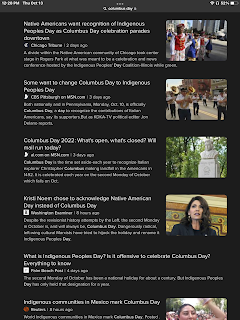Columbus Discovers America
And it was just the first of four voyages he would take, discovering not just the Bahamas, Cuba, and Hispaniola (today’s Dominican Republic and Haiti), but the Gulf of Mexico, and South and Central America too.
He was a busy guy, when he wasn’t subjugating entire races of people I guess.
On August 3, 1492, Columbus set sail from Palos, Spain, with three small ships, the Santa Maria, the Pinta and the Nina. On October 12, the expedition reached land, probably Watling Island in the Bahamas. Later that month, Columbus sighted Cuba, which he thought was mainland China, and in December the expedition landed on Hispaniola, which Columbus thought might be Japan. He established a small colony there with 39 of his men. The explorer returned to Spain with gold, spices, and “Indian” captives in March 1493 and was received with the highest honors by the Spanish court. He was the first European to explore the Americas since the Vikings set up colonies in Greenland and Newfoundland in the 10th century.
He had a bit of trouble getting the first voyage financed, rejected by King John II of Portugal and then King Ferdinand and Queen Isabella of Spain (twice) before they finally agreed after Spain defeated the Moors (or “Moops”) in January 1492 at Granada.
Just 14 years later in 1506 he passed away, and Spain — which had hoped to find a route to the “Far East” — instead discovered the New World and all the riches and peoples they could plunder.
Columbus died in Spain in 1506 without realizing the scope of what he did achieve: He had discovered for Europe the New World, whose riches over the next century would help make Spain the wealthiest and most powerful nation on earth. He also unleashed centuries of brutal colonization, the transatlantic slave trade and the deaths of millions of Native Americans from murder and disease.
Well, let’s be honest here, it wasn’t really Columbus who “unleashed” all that, it was Spain, followed by the British, French, and Dutch.
Colonization, slavery, murder and disease was just how the whole world worked. For thousands of years. This was nothing new.
Slavery and the slave trade was practiced by every nation with the power to do so, since the beginning of time. Until the British outlawed slavery in 1807 (and the slave trade in 1833) it was the worldwide historical norm. All of history has been thus, for everyone everywhere — except for the rich and powerful of course, and they got rich and powerful by subjugating and enslaving and murdering people, and taking land and property, and every other form of unpleasantness one can imagine.What exactly are we supposed to do about it? Impose modern expectations of civilization, of human rights that didn’t exist yet, upon an earlier time? It was what it was, and it’s best to view it by the norms of the time.
Life for everyone everywhere was nasty, brutish, and short.
If it wasn’t Columbus who discovered America somebody else would have, and that man would get blamed as Columbus is now, and either way the exact same colonization and enslavement and murder would have followed just as night follows day, for the reasons given above.
The revisionist tries to willfully misrepresent history and demonize everyone who ever did great things for daring to live in their own times according to the accepted norms of the time, instead of in today’s times according to today’s norms. It’s tiresome, ahistorical, and tremendously disrespectful towards leaders of the past, and makes us all dumber and myopic.
Link:
https://www.history.com/this-day-in-history/columbus-reaches-the-new-world
